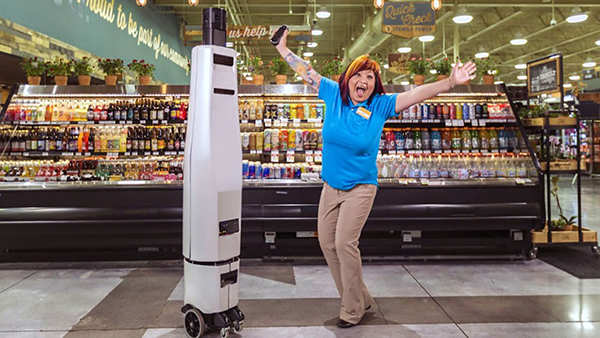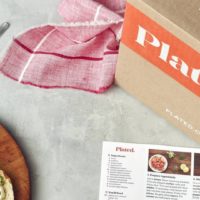
Every week we track the business, tech and investment trends in CPG, retail, restaurants, agriculture, cooking and health, so you don’t have to. Here are some of this week’s top headlines.
Bossa Nova Robotics raised $17.5 million to build out its line of inventory-scanning retail robots. The funding round comes fresh off of a deal with Walmart that will roll out its robots across 50 of the retailer’s locations. Good news came for the big-box chain as it posted its strongest quarterly U.S. sales growth in nearly a decade. Ovenly, a New York City retail and wholesale bakery business, is creating a more inclusive economy through an open hiring process for its bakery, working with organizations to hire political refugees and citizens returning from the criminal justice system.
Chobani CEO and founder Hamdi Ulukaya envisions Twin Falls, Idaho as the ‘Silicon Valley’ for food innovation. The city is home to the company’s largest yogurt factory and home base for its global R&D team. The Italian 180-year-old company, Barilla, is embracing the future of food through a new venture fund and innovation hub called Blu1877.
In restaurant news, a new organic fast food restaurant called Grown is cropping up in in sports stadiums, hospitals and even Walmart. DoorDash added former Twitter VP of engineering, Jeremy Rishel, and former VP of product at Groupon, Rajat Shroff, to its team in its efforts to expand into more cities and deliver products other than food. Chef José Andrés explained in a talk for TEDx MidAtlantic how he and his nonprofit World Central Kitchen served more meals than any other organization as well as the struggles he faced with FEMA. The Restaurant Opportunities Center (ROC), a progressive labor organization that provides education and support to restaurant workers, has created a “Racial Inequity Toolkit”: a how-to manual for restaurant owners and management who want to begin weeding out potential sources of racial and gender bias in their hiring and operational practices.
Will a meatless food industry featuring lab-grown meat, seafood substitutes, and insect protein be the future of food? CB Insights put together a report on how the $90 billion global meat industry gets disrupted. Investigation into the USDA deregulation team reveals deep ties to the industries being regulated, including those that oppose environmental regulations, corporate lawyers and political dark-money groups.
Check out our weekly round-up of last week’s top food startup, tech and innovation news below or peruse the full newsletter here.
_______________
1. Bossa Nova Raises $17.5M for Retail Robots – TechCrunch
The Series B round was led by Paxion, bringing total funding to $41.7m. The startup plans to use the capital to build out its team, with a focus on autonomy software and artificial intelligence.
2. Barilla Launches Blu1877, A Food Focused Venture Fund & Innovation Hub – The Spoon
Its first focus is making seed investments in food entrepreneurs that are creating new products related to Barilla’s core business and adjacent markets in pasta and meal solutions.
3. Walmart Posts Strongest US Sales in Years, Powered by Groceries, E-Commerce – Wall Street Journal
Shares jumped more than 8% for the world’s largest retailer. Its grocery business delivered the strongest quarterly same-store sales growth in more than five years, including sales from online grocery pickup now.
4. Chobani Wants Twin Falls To Be a ‘Silicon Valley’ for Food Innovation – Magic Valley
Chobani wants to turn Twin Falls, Idaho, the town that is home to his largest yogurt factory, into a center of food innovation. It broke ground on a 70k sf building that will house a startup incubator for Idaho food businesses, as well as office for its global R&D team and other employees.
5. An Open Door for Pesticide Lobbyists at the USDA – New York Times
Investigation into the USDA deregulation team reveals deep ties to the industries being regulated, including those that oppose environmental regulations, corporate lawyers and political dark-money groups.
6. Our Meatless Future: How The $90B Global Meat Market Gets Disrupted – CB Insights
Will a meatless food industry featuring lab-grown meat, seafood substitutes, and insect protein be the future of food? Food giants from Tyson to Cargill are working to navigate a future where protein isn’t dominated by traditional animal sources.
7. Grown Is a 100% Organic Fast Food Restaurant Coming to Your City Soon – Bon Appetit
Thanks to Shannon Allen, Grown restaurants are popping up in sports stadiums, hospitals, and even Walmart. The organic fast food restaurant has expanded to six locations in just 16 months.
8. DoorDash Has Hired Ex-Twitter and Groupon Execs to Spearhead Big Expansion Plans – Business Insider
Rishel and Shroff will help DoorDash fine tune its delivery time predictions and build the company’s ever-growing stable of restaurants and food brands.
9. Restaurants Have a Racial Equity Problem. Here’s How to Fix It. – Eater
The Restaurant Opportunities Center created a “Racial Equity Toolkit” for restaurant owners and management who want to weed out potential sources of racial and gender bias in their hiring and operational practices.
10. A Recipe for a More Inclusive Economy: Sweet Treats + Good Jobs – B the Change
Ovenly has had an open hiring policy since 2012, working with organizations to hire political refugees and citizens returning from the criminal justice system. The company has 56 employees and is quickly expanding to additional locations.
11. From 3D-Printed Meals to Electrocuting Your Food, These Startups Are Shaping the Future Of Cooking – CB Insights
Next-gen ingredients, robotic appliances, novel cooking methods, on-demand and personalized food have the potential to fundamentally change what we eat and how we cook it.
12. José Andrés Says FEMA Kicked Him Out of Its Building – Eater
In a TEDx talk, Andrés spoke about his experience grappling with FEMA as well as his strategy and execution feeding Puerto Rico.





